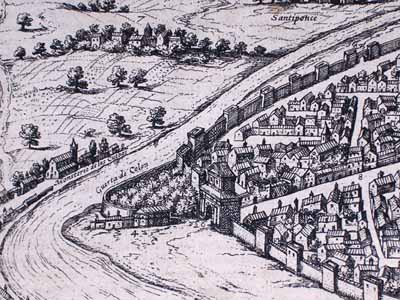
Between 1512 and his death in 1539, Hernando Colón (1488-1539, the natural son of Columbus) set about collecting one of the great libraries of the early modern age. ‘Without being a man of great estate’, one of his contemporaries recorded, ‘he travelled throughout Christendom searching out and bringing together books on all subjects’. At the time of his death the collection boasted over 15,000 volumes.
His bibliomania took him across Europe — on a single trip in 1530-1 stopping in (inter alia) Rome, Bologna, Modena, Parma, Turin, Milan, Venice, Padua, Innsbruck, Augsburg, Constance, Basle, Fribourg, Cologne, Maastrich, Antwerp, Paris, Poitiers and Burgos — and his meticulous records of his purchases allow us to trace his spending spree in great detail. Besides his own travels, his collection grew through the volumes sent via an extensive network of factors and correspondents in other Spanish and European cities. Unusually for its time, his library sought to collect printed books — considered by many libraries to be mere novelties — as well as precious manuscripts, expensive folios, and also leaflets of no more than ten pages. He also devised detailed and systematic methods for the classification of his volumes, making him one of the founders of modern bibliography. Colón acquired such expertise in book-purchasing that in his will he recommended the sort of itinerary that a good collector should follow in his endeavours to gather books. In line with the imperial ambitions of Charles V, Hernando Colón declared that his intention was to put together a universal library that would gather not just all the published material in Christianity, but also whatever was available beyond its frontiers.
Colón also played a part in many of the central intellectual currents of the day: educated at the Castilian court by the Italian Humanist Peter Martyr, he also travelled with his father to the New World (1502-1504) where he began a lifelong interest in cartography and anthropological information—which he promulgated in a biography of his father, the Historia del Almirante. He started to compile the first modern topographical description of the country, the so-called Descripción y cosmografia de España, with its companion Vocabulario topográfico. His cosmographical expertise also made him a valued diplomat and consultant. He served in delegations to Italy and elsewhere to defend Spain’s right to territories in the Americas, the Pacific and other regions of economic and geostrategic importance.
The core of his collection survives today, as the Biblioteca Colombina within Seville cathedral, and features a world-class collection of incunabula and manuscripts from the age of discovery and Humanism. For all its bibliographical and historical riches, this collection is scarcely known outside Spain as a resource for studying the material and intellectual culture of a key period in European history.
The fact that the collection was built after Columbus’s success in expanding the scope of the material, religious and economic ambitions of the West, also turns his son’s collection into an excellent case study for the intersection between the processes of colonial expansion and the transformations that the cartography of knowledge was undergoing in the early modern world. In bringing to fruition the transatlantic encounter between the wisdom received from Classical Antiquity, contemporary Western intellectual production and the novelties that kept coming from across the ocean, the whole collection pre-empts Francis Bacon’s call for an expansion of the frontiers of the intellect in his Instauratio Magna a century later: ‘Surely, it would be disgraceful if, while the regions of the material globe—that is, of the earth, of the sea, and of the stars—have been in our times laid widely open and revealed, the intellectual globe should remain shut up within the narrow limit of old discoveries’.
The project, led by Jose Maria Perez Fernandez (Universidad de Granada) and Edward Wilson-Lee (Cambridge), has recently won funding from the Cambridge Humanities Research Grants Scheme to hold a workshop in Cambridge. This workshop will disseminate existing knowledge about the library and its founder, and explore the potential of the collection for answering research questions in areas including book history, travel, knowledge organization, and intellectual networks.




